

Interlude HK Ltd
Welcome to Interlude, created by lovers of music for those who share their passion. Juliette Liu hopes to inspire you to embark on your own voyage of classical music and cultural discovery, and that you’ll come back and share your experiences with us.
Johann Sebastian Bach. Johann Ambrosius Bach, 1685© Wikipedia We always think of J.S.
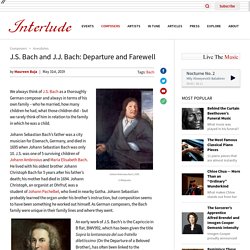
Bach as a thoroughly German composer and always in terms of his own family – who he married, how many children he had, what those children did – but we rarely think of him in relation to the family in which he was a child. Johann Sebastian Bach’s father was a city musician for Eisenach, Germany, and died in 1695 when Johann Sebastian Bach was only 10. J.S. was one of 5 surviving children of Johann Ambrosius and Maria Elisabeth Bach. He lived with his oldest brother Johann Christoph Bach for 5 years after his father’s death; his mother had died in 1694. Johann Sebastian Bach © Everett – Art/Shutterstock.com An early work of J.S. Written around 1704, the work is very much in the Italian style, despite being composed by a German composer. Bach: Capriccio sopra la lontananza del fratello dilettissmo, BWV 992: I. Romantic Classical Music. HK Cultural Centre Concert Hall © HK Phil With the maturation of recording and streaming technologies, it is now possible to listen to the best of classical music in the comfort of our own places.
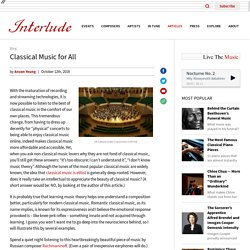
This tremendous change, from having to dress up decently for “physical” concerts to being able to enjoy classical music online, indeed makes classical music more affordable and accessible. Yet, when you ask non-classical music lovers why they are not fond of classical music, you’ll still get these answers: “it’s too obscure; I can’t understand it”, “I don’t know music theory”. Although the tunes of the most popular classical music are widely known, the idea that classical music is elitist is generally deep-rooted. However, does it really take an intellectual to appreciate the beauty of classical music? Instruments of the Orchestra - The Violin : Interlude. © violintutr.com When you attend a symphony orchestra concert, the first instrument you see, on the left of the stage, are the violins.

No classical music concert is complete without a violin. Violins are small string instruments that are played with a bow. The instrument is held in the left hand and the bow in the right hand. The fingers of the left hand press down the strings so that when the bow is moved across the string, a pitch is sounded. Parts of a violin© www.researchgate.net. Polish Composer : Interlude. Frédéric Chopin.
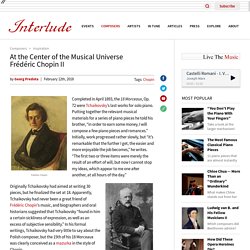
How do classical musicians get inspired ? Inspiration 1. the process of being mentally stimulated to do or feel something, especially to do something creative.

Robert Schumann: Piano Quintet in E-Flat Major, Op. 44 – IV. Allegro, ma non troppo (Fine Arts Quartet; Xiayin Wang, piano) Inspiration is a curious thing for creative people such as musicians. Contrary to popular belief, those “lightbulb” or “a-ha!” One of these is practicing. . © Kazuo ota / Unsplash Alongside this, a good routine is important. In the many interviews with musicians which I have published on my own blog, most cite teachers as significant sparks to inspiration. Working with colleagues and collaborators will often expand our musical horizons and challenge us to step outside of our creative comfort zone.
Inspiration also comes when mind and body are relaxed, so it’s important to give ourselves, as musicians, “down time”, to unwind and to take time away from the instrument. . © CMUSE.org. Instruments of the Orchestra - The Violin. Most Relaxing Classical Music Pieces of Great Composers for Cello. Ludwig van Beethoven © Chicago Symphony Orchestra For Beethoven the pianist, the piano sonata and the piano concerto were his star vehicle of choice.
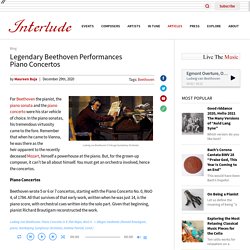
In the piano sonatas, his tremendous virtuosity came to the fore. Remember that when he came to Vienna, he was there as the heir-apparent to the recently deceased Mozart, himself a powerhouse at the piano. Famous Classical Music Pieces. Most Popular Classical Pieces of Music in 2020 : Interlude. Vivaldi I am sure you have noticed already, but it is getting really difficult to find your way around classical music these days.

That particular musical world is full of influencers and marketing specialists that are happy to tell you exactly what you should think. And every orchestra, performer, and soloist is the best of the best in the world and even the entire universe. That kind of super hype is really pretty exciting, but how can we really find out what are the most popular classical pieces of music in 2020? Of course we could try to check on all the likes on Facebook and YouTube and countless other social media sites and platforms. Antonio Vivaldi: The Four Seasons. Classical Music Quiz. Piano Instrumental Music : Interlude. Chopin Playing the Piano in Prince Radziwill’s Salon© Henryk Siemiradzki/WikiCommons.
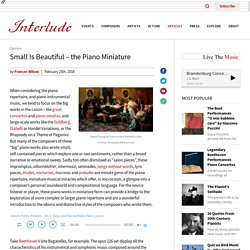
Love Stories of Classical Composers, Love Life of Classical Composers. Famous Classical Composers. New Pieces to Try If You’re Stuck for Repertoire Ideas : Interlude. Pianists are very spoilt for choice.

We have a huge repertoire to draw on and a seemingly endless array of music to explore, with new music being added to the repertoire all the time. In addition, in the world of piano teaching, there are many wonderful collections and anthologies of music to tempt and inspire pianists of all ages, levels and tastes. From the “core classics” of piano literature by Bach, Haydn, Mozart, Beethoven, Schubert, Brahms, Chopin, Rachmaninoff, Debussy, Bartók, and more, to transcriptions of works for other instruments, songs from the shows, jazz, world and pop music, there is no need to be stuck for repertoire ideas. And yet those of us who play or teach regularly know that sometimes it can be confusing or difficult to find new repertoire. Less experienced players may find it hard to discover new pieces to play and may be nervous of seeking out new repertoire without guidance, so piano teachers can help here. Minuet in F – Leopold Mozart.